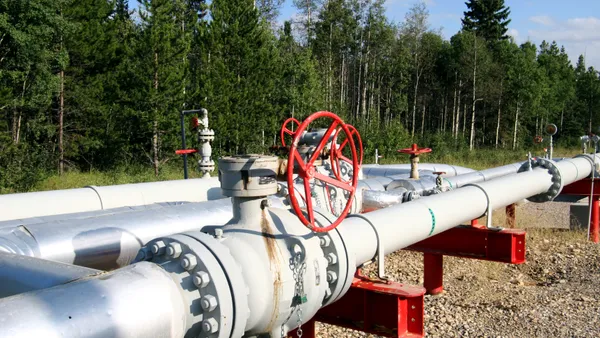Dive Brief:
- The energy portfolios of 21 leading private equity firms are responsible for emitting at least 1.17 billion metric tons of carbon dioxide equivalent annually due to investments made in fossil fuels, coal-powered plants and liquified natural gas, according to research unveiled Wednesday.
- The report found that the firms — which collectively manage $6 trillion in assets — have invested 67% of their energy portfolio in fossil fuels, which generate a carbon footprint that rivals that of the 2023 Canadian wildfires and exceeds the emissions of all global flights taken in 2019.
- Firms surveyed as part of this year’s Private Equity Climate Risk Scorecard include Apollo Global Management, KKR, Ares Management, Blackstone, BlackRock’s private equity arm and Global Infrastructure Partners, which BlackRock completed an acquisition of last week.
Dive Insight:
The report was compiled by researchers from three nonprofits: Americans for Financial Reform Education Fund, Global Energy Monitor and the Private Equity Stakeholder Project. The scorecard ranked the 21 firms based on the fossil fuel assets they own, emissions produced by those assets and the firms’ progress toward a green transition and setting decarbonization targets.
Other firms surveyed for the scorecard include The Carlyle Group-backed NGP Energy Capital Management; ArcLight Capital Partners; Brookfield’s Oaktree Capital Management; EIG Global Energy Partners; Encap; Energy Capital Partners; EQT; I Squared Capital; IFM Investors; Kayne Anderson Capital Advisors; MacQuarie Asset Management; Quantum Capital Group; Stonepeak Infrastructure Partners; TPG Inc. and Warburg Pincus.
Out of the firms surveyed, Apollo, EQT, MacQuarie and TPG scored a “B” — the highest on the survey — with 60%, 17%, 64% and 38% of their energy portfolios invested in fossil fuel companies, respectively.
On the flip side, EIG Global Energy Partners received an “F” for concentrating 82% of its energy portfolio on fossil fuels assets that generate over 271.8 million tons of carbon dioxide equivalent annually. As of July, the firm is invested in 23 fossil fuel companies, including six LNG terminals and eight upstream oil and gas companies.
“Private equity firms and their executives are making billions by investing public employees’ retirement money into planet-destroying fossil fuel assets,” Amanda Mendoza, Private Equity Stakeholder Project’s senior climate research and campaign coordinator, said in an Oct. 2 press release. “These billion-dollar companies make their profits while largely avoiding liability for the damages their fossil fuel investing causes frontline communities.”
The report’s authors also said that increased investments in private markets comes with a caveat of decreased transparency on the climate impact of those assets, as private equity firms are not covered by most regulatory requirements and financial disclosures. The authors said this exemption ends up “leaving regulators with more blind spots concerning the risks buyout firms might pose.”
The report said that private equity firms are exacerbating the climate crisis by opting to invest in “polluting portfolios.” Money funneled into assets that drill, frack, transport, store and refine fossil fuels opposes guidance laid out by international policymakers and climate scientists to limit the temperature increase to 1.5 degrees Celsius in line with the Paris Agreement, according to the report’s authors.















